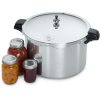I'm planning to buy a pressure cooker in the next week or so to remove the risk of botulism spores surviving in my jars and I have 3 questions to seasoned canners here.
1. Not all pressure cookers are created equal: Pressure cookers that heat up to the required 120-130 C are around £500. The affordable ones have a limit of 100 degrees Celsius, I take it that's not enough - even though the food is cooked under pressure? It would be great to save money if possible.
2. Oven canning as an alternative? Some time ago someone mentioned oven canning to me and I've been wondering if this could be an alternative to buying an expensive pressure cooker? Does anyone know whether it is the temperature that kills off botulism spores? Or does the pressure generated by the pot have a role to play too?
It would not be a problem to reach the required 120-130 degrees Celsius and it seems to be a good alternative to buying a pressure cooker. But I found sources that say that dry heat (air in the oven) is different to wet heat (water) because water conducts heat better than air. And just because the temperature in the over reaches 130 degrees Celsius doesn't mean the temperature in the jar does too.
Here's a section from
an example article I found about pressure cooking in an oven. I don't want to blindly trust random online sources so if anyone has reasons to think those concerns aren't accurate I'd love to hear your views:
3. The this the one? To those of you who have a pressure cooker that goes over 100 degrees, does your cooker look more or less like
this one? That's the one I'm considering buying and I want to make sure I'm buying the right thing:
View attachment 52425 View attachment 52426
I've had a couple, both by made by "Presto". (My first one was lost in a move.)
They work very well, can achieve the high temps needed for meat, and of all the brands, they appear to be the most affordable by quite a margin. I paid about $160 for my current one. eBay is worth checking as well as other sales sites. (Though, I would only buy new from any site. There's a silicone sealing ring in mine which I believe can decay given enough time and mistreatment.)
My current one looks like this:

It has a "jiggler weight" on top to regulate pressure, with three weighted rings you add or subtract depending on the pressure you want to maintain during a boil, (and your altitude). It's all detailed in the instruction manual, but it's very simple.
My previous one I think might have been a newer model, and it had a proper pressure gauge (which I found stressful during boils; I'd constantly be checking on the thing to turn heat up or down to keep the needle in the recommended range). The weighted ring system seems much smarter to me; it automatically adjusts based on natural feedback; if the pressure goes too high, it lets out steam, if too low, it doesn't. It's nothing more complicated than a small weighted plug over a hole. Both cookers worked fine, though.
(Just to be on the safe side, I've run all my boils 20 minutes longer than necessary.)
I got the 16 Oz one, which will fit on my stovetop and doesn't take forever to reach boiling. These things are huge, and my first one (the next size up), was unwieldy.
I went on a road trip once and took a 'pallet' of jars which I'd done a couple of years earlier and ate about half of them over the next ten days. They were either pork or beef; I can't remember, but they were surprisingly tasty. (They reminded me a bit of canned tuna but without the fishiness and that vague concern that I was ingesting heavy metals.)
As for the stove and oven idea...
Logically, if you can achieve the correct temps for long enough and avoid contamination, then I don't see why it wouldn't work, but I probably wouldn't do it. A pressure canner is purpose-built for the job and very reliable. I'd rather trust a company whose stock and trade is
not poisoning people and which has a long track record of happy, not-poisoned clients. Their engineering seems first rate to me. (And I'm still-living proof.)


 I think you guys are right that although in theory oven canning should work, in practice it may not. I don't want to take that risk. I read about botulism and although it's extremely rare (145 a year in the US, a population of 330 million) and apparently only 30% of cases are from adult food consumption, I figured that those stats are among a population that doesn't do a lot of home canning. It's likely I will live off my canned food, which will increase those statistics. And given how quickly the quality and availability of medical services has been deteriorating it's massively important to reduce the risk of needing urgent help.
I think you guys are right that although in theory oven canning should work, in practice it may not. I don't want to take that risk. I read about botulism and although it's extremely rare (145 a year in the US, a population of 330 million) and apparently only 30% of cases are from adult food consumption, I figured that those stats are among a population that doesn't do a lot of home canning. It's likely I will live off my canned food, which will increase those statistics. And given how quickly the quality and availability of medical services has been deteriorating it's massively important to reduce the risk of needing urgent help.


